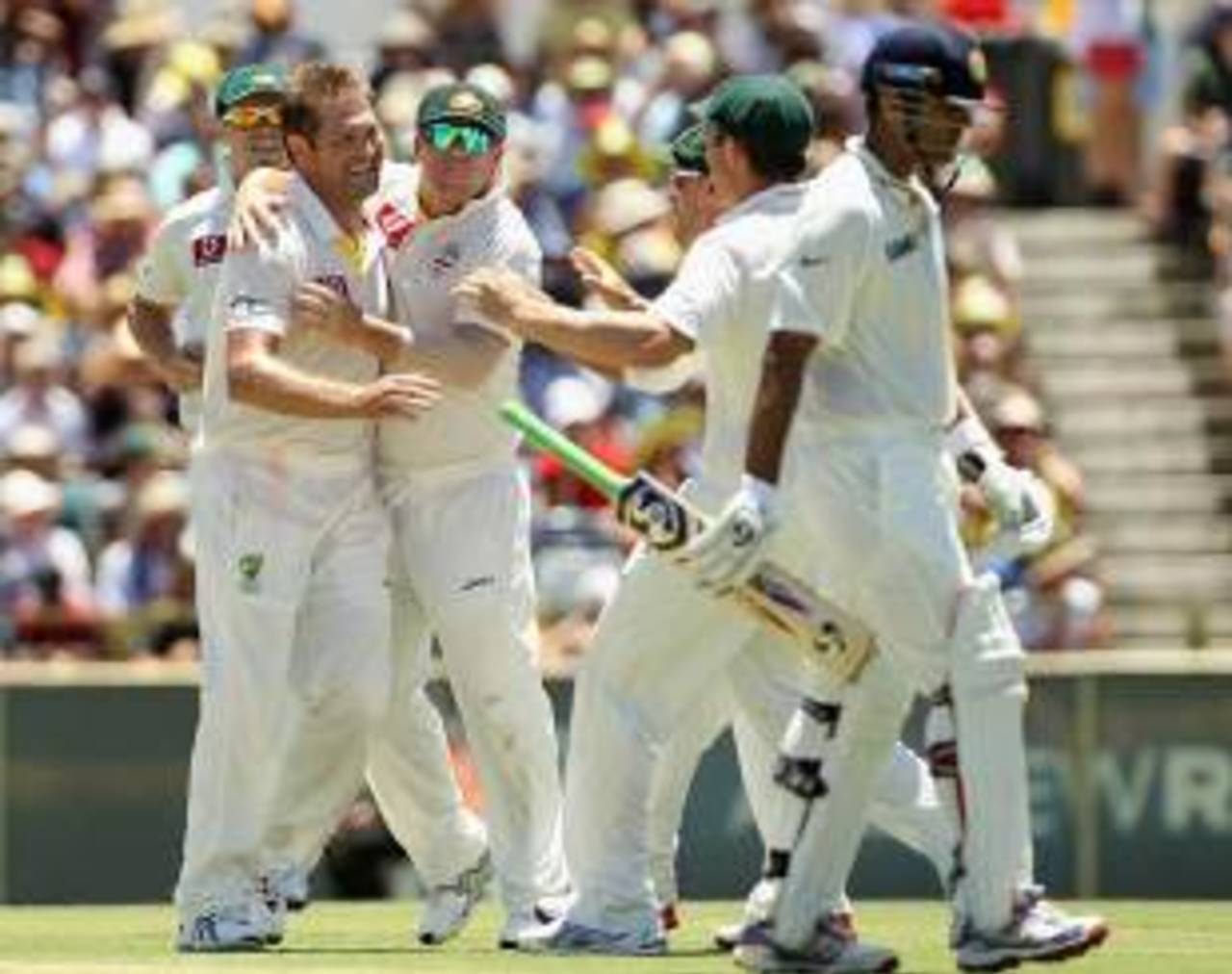India never cultivated aggression, even when they were No.1
Nothing has surprised me more than the defences mounted of Dhoni's tactics in Wellington and Dominica
Samir Chopra
25-Feb-2013

India have often eased off after taking a lead in a series • Getty Images
India's recent run of seven away Test defeats, despite sometimes involving spells of competitive play (and arguably, at the MCG, a real chance to win), have been marked by a lack of competitiveness: four by an innings, one by over 300 runs, another by almost 200 runs, one by over 100 runs. Out of those seven Tests only two have gone the distance, while the game in Perth ended in two-and-a-half days.
The analysis of India's defeats has been copious and plentiful. One aspect of this analysis has centred on the seeming lack of fight, of aggression and resolve: India's Test team rose to the No. 1 ranking because it had shown the ability to fight back from adversity; what happened to those reserves that enable champion teams to claw their way out of the bear-trap of a grim sporting circumstance?
I have five reasons to offer: The Oval 2007, Bangalore 2007-08, Mohali 2008-09, Wellington 2008-09 and Dominica 2011.
In each of those games India had a chance to drive home a decisive advantage to increase the margin of victory in a series. In each case, Indian - it did not matter who the captain was, for in these games they were led by Rahul Dravid, Anil Kumble and MS Dhoni - declined to pick up the gauntlet. In each case, they missed a chance to cultivate a quality that is as valuable as the ability to fight back from adversity: to stay on top of an opponent who is down, to manoeuvre yourself into a winning position through aggressive play.
India lost out on valuable opportunities to cultivate and nurture reserves of aggression that would have stood them in good stead when adversity again presented itself. Sometimes (Oval 2007) it involved a failure to enforce a follow-on and, failing that, to aggressively fight back from temporary misfortune to again assert themselves in a situation where they had the sporting and psychological upperhand; sometimes it involved a failure to score quickly and declare in time (Bangalore 2007-08) or even consider that opportunity (Mohali 2008-09); sometimes it involved ludicrous delays in a declaration (Wellington 2008-09); and lastly, and most bizarrely, declining a chase for a victory target (Dominica 2011).
Though I have been a fan of the Indian cricket team for many years now, and thus have grown used to the idiosyncratic reactions of my fellow travellers, nothing has surprised me more than the defences mounted of Dhoni's tactics in Wellington and Dominica. Reacting angrily to a defeat is understandable; apologia for a lack of imagination and cricketing backbone is considerably less so.
The Indian cricket team will return to India soon; heads will roll; and a new season of cricketing encounters will kick off. But personnel and venue changes will do little to change Indian cricketing fortunes unless something is done to change a mindset that is comfortable with 1-0 leads, that fears possible defeat when pursuing victory. The edge that is sharpened in rejecting sitting on leads, in finding ways, to not just save a game, but to win a game that looks only half-winnable, is an invaluable weapon; it enables the summoning up of reserves in hopeless situations, like the ones that India have all too often, in the last year, found themselves in.
Talk of grassroots change and the new generation in Indian cricket is indeed appropriate at this stage. I would ask that some attention be paid to these five recurrences of one of Indian cricket's oldest maladies, present even when the team is winning and returns home with trophies and laurels. If defeat is to be subjected to forensic examination, then let us do the same even in times of seeming triumph. Valuable lessons lurk there as well.
Samir Chopra lives in Brooklyn and teaches Philosophy at the City University of New York. He tweets here